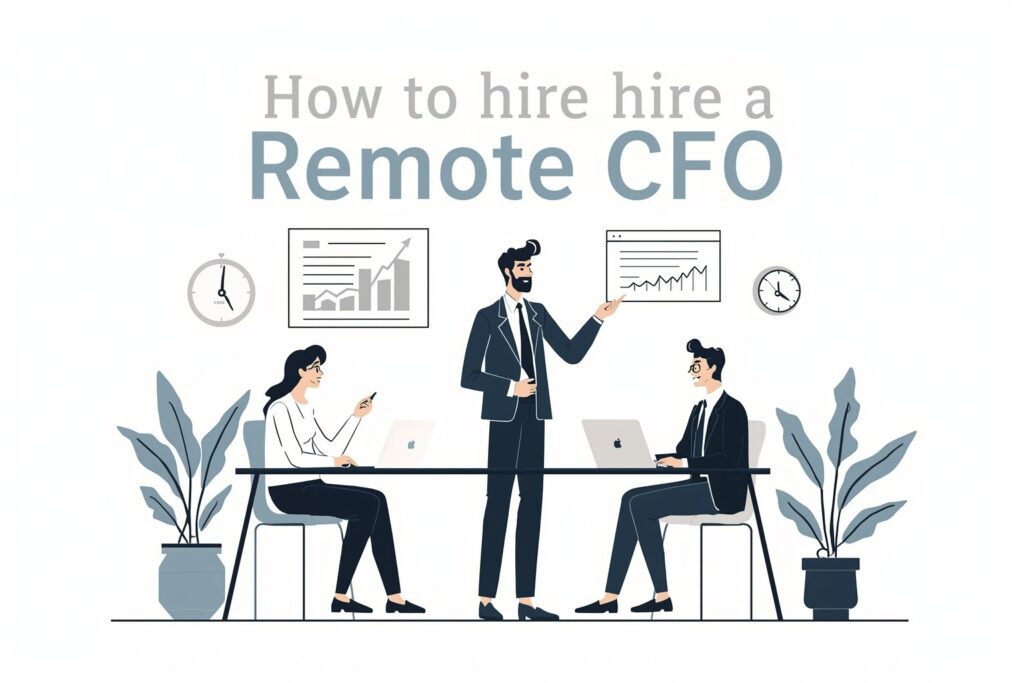In today’s digital landscape, hiring a remote Chief Financial Officer (CFO) can be a strategic move for business owners seeking to optimize their financial operations without the overhead of an in-house executive. Whether you’re a startup or a growing enterprise, a remote CFO can provide you with the financial expertise you need to scale your business effectively. This guide offers a structured 9-step approach to help you find the right remote CFO for your organization.
1. Define Your Needs
Before you begin the hiring process, take the time to define your financial needs. Consider the following:
- What specific financial challenges are you facing?
- Do you need help with budgeting, forecasting, or financial strategy?
- What industry knowledge is essential for your business?
Having a clear understanding of your requirements will streamline your search and ensure you find a candidate who meets your expectations.
2. Determine Your Budget
Establishing a budget is crucial when hiring a remote CFO. Remote financial professionals can vary widely in cost, so consider the following:
- What is your budget range for this role?
- Are you looking for a part-time or full-time CFO?
- What additional costs might be involved (e.g., software, tools, etc.)?
Decide on a competitive salary that reflects the expertise you seek while remaining within your financial capabilities.
3. Create a Clear Job Description
A well-crafted job description is essential for attracting the right candidates. Include:
- Key responsibilities (e.g., oversee financial reporting, manage cash flow)
- Required qualifications (e.g., experience in your industry, familiarity with relevant software)
- Desired soft skills (e.g., communication, leadership, strategic thinking)
Make your expectations clear, so candidates know exactly what you’re looking for.
4. Use Effective Sourcing Strategies
To find potential candidates, utilize various sourcing strategies:
- Post on specialized job boards (e.g., CFO.com, Remote.co)
- Leverage professional networks (LinkedIn, industry associations)
- Consider finance staffing agencies that specialize in remote talent
Broaden your search to include global talent, providing you with a wider pool of qualified candidates.
5. Evaluate Candidates Thoroughly
Once you have a list of candidates, evaluate them against your defined criteria. Follow these steps:
- Review resumes and cover letters for relevant experience.
- Conduct initial phone screenings to assess communication skills and cultural fit.
- Utilize assessment tools or case studies to test their financial acumen.
Ensure you are not only looking at qualifications but also how well candidates align with your company culture.
6. Conduct In-Depth Interviews
In-depth interviews allow you to gauge candidates’ expertise and personality. Focus on:
- Behavioral questions (e.g., “Describe a time you had to manage a financial crisis.”)
- Technical questions related to your specific financial needs.
- How they would approach your unique business challenges.
This is your opportunity to assess how they think and solve problems.
7. Check References and Backgrounds
After narrowing down your candidates, always check references and conduct background checks. This step is vital for:
- Validating their previous employment and achievements.
- Understanding their work ethic and professionalism from former colleagues.
Take the time to gather feedback from their past employers to ensure you’re making a well-informed decision.
8. Discuss Compensation and Terms
Once you’ve identified your top candidate, discuss compensation and terms of engagement. Consider:
- Salary and bonus structures.
- Work hours and availability expectations.
- Contract duration and any potential for extension.
Be transparent about your budget constraints while also valuing their expertise.
9. Onboard Effectively
Once you’ve hired your remote CFO, a structured onboarding process is essential for success. Focus on:
- Familiarizing them with your financial systems and team.
- Setting clear objectives for the first 90 days.
- Regular check-ins to ensure alignment and address challenges.
A smooth onboarding will set the foundation for a productive working relationship.
Case Study Example
Consider a tech startup that needed financial oversight but couldn’t afford a full-time CFO. By following these steps, they hired a remote CFO with a background in technology funding. Within six months, the startup secured investment funding and improved their cash flow management, all thanks to the strategic guidance of their remote CFO.
TL;DR
- Define your financial needs clearly.
- Establish a budget for hiring.
- Create a detailed job description.
- Use diverse sourcing strategies to find candidates.
- Evaluate candidates thoroughly through interviews and assessments.
- Check references and backgrounds before making a decision.
- Discuss compensation and terms transparently.
- Implement a structured onboarding process for your new CFO.
Hiring a remote CFO can be a game-changer for your business. If you’re ready to take the next step, contact us to hire a remote CFO or hire a remote bookkeeper today and optimize your financial operations.








Leave a Reply